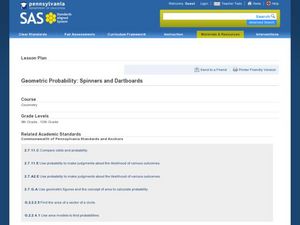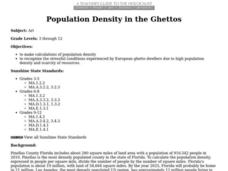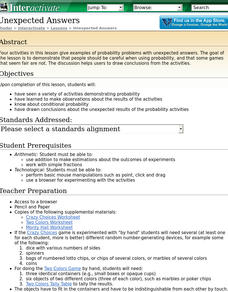Curated OER
What is a P-value?
Learners test the hypotheses using p values. In this statistics lesson plan, students define and examine conditional probability. They test each statement for a true statement or a false statement, based on the sample size.
LABScI
Genetic Equilibrium: Human Diversity
Investigate the Hardy-Weinberg Principle to explain genetic equilibrium. The 10th lesson plan of a series of 12 is a laboratory exploration of genetic equilibrium. Your classes use a mixture of beans to model allele and genotype...
Teach Engineering
The Grand Challenge: Fix the Hip Challenge
It may be time to get to know the skeletons in your family. The first lesson in a series of 5, introduces the class to the concept of osteoporosis. The class members brainstorm possible causes and whether the family should be concerned...
Curated OER
Geometric Probablitiy: Spinners and Dartboards
Sstudents explore and analyze the properties of geometric areas. In this geometry lesson plan, sstudents use technology to simulate spinners and dartboards in order to fing areas of circles and sectors of circles and compare and...
Curated OER
Investigation - Design Your Own Spinner
Seventh graders use ideas of uncertainty to illustrate that mathematics involves more than exactness when dealing with every day situations. The main standard of this instructional activity is statistics and probability.
Curated OER
Pre-Activity Worksheet: Natural Selection
Although the instructions include reading from a specific textbook, the tasks are appropriate for any unit dealing with how genotype frequency changes over time. Junior biologists define five vocabulary terms and then answer five...
Curated OER
Weather Conditions During the Spring Monarch Migration
Students keep detailed weather records during the spring migration of the monarch butterfly. To keep track of the weather, students utilyze weather reports and instuments such as anemometers, compasses, thermometers and rain gauges.
EngageNY
Margin of Error When Estimating a Population Proportion (part 2)
Error does not mean something went wrong! Learners complete a problem from beginning to end using concepts developed throughout the last five lessons. They begin with a set of data, determine a population proportion, analyze their result...
Curated OER
Punnett Squares
Eighth graders take a short quiz on genotypes and phenotypes. As a class, they are introduced to the concept of Punnett Squares and listen to a description of Gregor Mendel's pea experiment. In groups, they complete Punnett Squares to...
Curated OER
Population Density in the Ghettos
Students make calculations of population density to recognize the stressful conditions experienced by European ghetto dwellers due to high population density and scarcity of resources.
Curated OER
Weather Map
Ninth graders utilize several different types of maps to forecast weather conditions specific areas of the country. Air masses, wind, cloud types, fronts, and the pH of the rain is explored in this lesson.
Curated OER
How do engineless planes stay aloft?
Fifth graders explore how a plane can stay aloft. In this engineless airplane flying lesson, 5th graders experiment to find how the design of a plane and Bernoulli's principle keep planes in the air. Student's create a plane and answer...
Curated OER
Paleoecology of "Fossilized" Owl Pellets
Students examine fossilized owl pellets to determine how a species environmental preferences allow us to reconstruct probable past environments. Differences in anatomy are used to identify species in this lesson.
Institute of Electrical and Electronics Engineers
Spring Scale Engineering
After examining how a spring scale works, teams work together to design their own general measurement device. Reading material provides background information, but there is no part of the procedure in which learners handle an actual...
University of Colorado
Is There Life on Earth?
To find life on another planet, scientists look for gases (atmosphere), water, and temperatures that are not extreme. In this activity, groups of pupils become "Titan-ians," scientists who want to explore Earth for possible life forms....
Curated OER
What are the Odds
Students predict the-outcome of an event. In this algebra lesson, students compare and contrast the probability of an event occurring. They calculate the odds of a simple event and make estimation.
Curated OER
Unexpected Answers
Students consider probability problems with unexpected and surprising answers.
Curated OER
Paleoclimates and Pollen
Young scholars analyze soil for types of pollen to determine the probably climate conditions. In this earth science lesson plan, students make conclusions on what a climate is like based on soils samples. Young scholars use a model soil...
Curated OER
Weather Conditions During the Spring Monarch Migration
High schoolers keep a detailed record of weather patterns during the spring migration of the monarch butterfly. The use of weather reports is used to form a class data sheet. This instructional activity connects to the skills of graphing...
Curated OER
A Sputtering Image
Learners explain the role of genes in heredity. In this biology lesson, students predict the offspring's genotypes and phenotypes using the Punnett Square. They compute the probability of genotypes and phenotypes.
Curated OER
Predicting Severe Weather
Students recognize the range and variety of severe weather. They plan for severe weather conditions that they may experience on an immediate and long-term scale and use climate information to make personal choices about where to live and...
Curated OER
Torque Me Off
Students investigate the lever and the mathematics associated with levers. They determine the conditions necessary to balance a system of forces around a fulcrum.
Curated OER
Weather Watch
Students complete a series of lessons in which they study daily weather patterns and examine extreme weather conditions. They complete activities that range from visual observation of daily weather to building a weather station and...
Curated OER
Genetic Disorders with Cultural Roots: International Insects
Students recognize that certain populations have specific genetic disorders that could benefit or harm them in their environment, work out punnett square problems and infer offspring probabilities from results, and provide advantages and...

























